Milton Friedman: End the Fed by Patrick S.J. Carmack
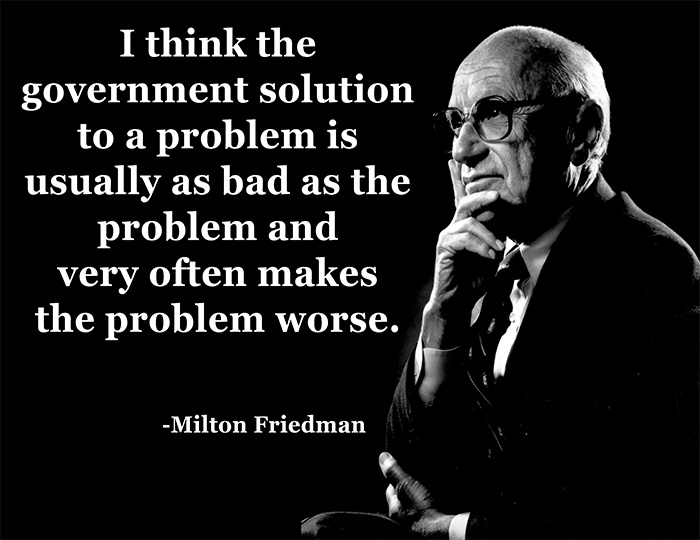 Withdraw from the Bank for International Settlements, the IMF and the World Bank
Withdraw from the Bank for International Settlements, the IMF and the World Bank
Nobel Laureate Milton Friedman is known now as one of the most influential economists of the 20th century. As our readers will have noted, Dr. Friedman praised our Monetary Reform Act and perhaps unbeknownst to them assisted in drafting it, with suggestions and constructive criticisms. Yet a few of our readers have emailed wondering how Dr. Friedman could support genuine reform in the markets based on reform legislation when he seemed to be fundamentally opposed to government interference in the marketplace.
The distinction is between theory and practice. Theoretically to minimize government interference in the operation of the free markets is an ideal, which follows Frederich von Hayek’s (author of 1944 classic The Road to Serfdom) view that maximizing the ability of business to allocate resources efficiently at the lowest levels without government or political interference combined with the freedom to contract worked best to ensure a productive economy. Conversely, the failed examples of communist and socialist governments, which prohibited or controlled private business nearly totally, seemed to cement Hayek’s view as the correct approach.
The gradual victory of Hayek’s anti-regulatory, pro-market economic views in the West, largely through the influence of Milton Friedman particularly in the 1980s Reagan-Thatcher period (Friedman was an economic advisor to President Reagan) began a worldwide deregulatory trend that eventually included the financial sector. The Economist magazine praised him as “the most influential economist of the second half of the 20th century…possibly of all of it“. In 1988 he received the Presidential Medal of Freedom and the National Medal of Science. Initially the results of implementing his pro-market prescriptions were largely positive. Excessive government regulation, particularly in more socialist economies, had in fact created a stranglehold on businesses – especially small to medium-sized – that was doing far more harm than good.
Pushed too far the same views that initially helped business resulted in an extreme anti-regulatory environment that began to benefit only the largest companies as they were increasingly freed to use their economic power to warp the free markets in their favor. This became particularly true in the financial sector in the 1990’s when they succeeded in getting part of the 1933 Glass-Steagal Act repealed with passage of the 1999 Gramm-Leach-Bliley Act. A host of federal and state regulatory acts stemming from the experiences of the Great Depression were repealed in the 1990s and beyond. Branch banking and interstate banking became widespread resulting in numerous bank mergers consolidating most banking into a handful of banks later deemed TBTF (Too Big to Fail) and so were given special, favored treatment by Treasury Secretary Hank Paulson and later Secretary Tim Geithner and Fed Chairman Bernanke with taxpayer-financed bank bailouts and low interest loans. The foxes were rewarded for gutting the hen house.
Without recounting those partial causes of the 2007-2010 Credit Contraction, suffice it to note that one result was a trend away from the almost laissez-faire (French trans. “leave it alone”) anti-regulatory approach of the 1980s on. Some have turned the blame for the current situation on Milton Friedman. Is that fair? It depends on who and what is to blame for the current recession/depression (as Present Reagan sagely noted, “If your neighbor is unemployed it’s a recession; if you are unemployed it’s a depression”).
Let us listen to Milton Friedman on the single cause of severe economic depressions:
“I know of no severe depression, in any country or any time, that was not accompanied by a sharp decline in the stock of money, and equally of no sharp decline in the stock of money that was not accompanied by a severe depression.”
Was Friedman right this time too – was this recession/depression caused by a “sharp decline in the stock of money.” If so, what was its origin? Let’s start with a look at the top of the international financial system.
The Central bankers’ Bank for International Settlements (BIS) in 1988 in its “Basel I” regulations imposed an 8% capital reserve standard on member central banks. This almost immediately threw Japan (which had banks with 3-5% capital reserves) into a 15 year economic depression as those banks contracted credit to comply with Basel I. In 2004 Basel II imposed “mark to the market” capital valuation standards that required international banks to revalue their reserves according to changing market valuations (such as falling home or stock prices). The US implemented those standards in November, 2007. Almost immediately, in December 2007 the US stock market collapsed and credit began drying up as banks withheld loans to comply with the 8% capital requirement as collateral valuations, particularly on homes, began to drop. The snowball effect of tightening credit, which reduces economic activity and values further, which resulted in further tightening of credit, etc., has produced a worldwide recession/depression.
Was Friedman to blame for that, or was the BIS and implementation of its Basel II regulations?
For those unfamiliar with the BIS – it is the central bankers’ bank. It is above all governments, is exempt from the laws of its host country – Switzerland, and its regulations, which are adopted among its 53 member Central banks, become in effect part of the banking law of those nations without legislative approval (such as that of the US Congress). Yet they effect the economies of those member nations and that of the world, as we are still experiencing, a’ la Japan. The BIS is in most respects, when combined with the IMF (International Monetary Fund) and World Bank, a worldwide version of the US Federal Reserve System. Here is former JP Morgan Chase CEO Walter Shipley on this point re the IMF:
“The same thing is true on the international front. The world clearly needs the global equivalent of the Federal Reserve. That is what the role of the IMF is.”
What was Milton Friedman’s attitude towards the Fed (and towards the BIS/IMF/World Bank combo which is the global equivalent of the US Fed). For starters, he squarely blamed the Great Depression on the Fed:
“The Fed was largely responsible for converting what might have been a garden-variety recession, although perhaps a fairly severe one, into a major catastrophe. Instead of using its powers to offset the depression, it presided over a decline in the quantity of money by one-third from 1929 to 1933 … Far from the depression being a failure of the free-enterprise system, it was a tragic failure of government.”.—Milton Friedman , Two Lucky People, 233
Friedman was opposed to the very existence of the Fed:
“Any system which gives so much power and so much discretion to a few men, [so] that mistakes ‑‑ excusable or not ‑‑ can have such far reaching effects, is a bad system. It is a bad system to believers in freedom just because it gives a few men such power without any effective check by the body politic ‑‑ this is the key political argument against an independent central bank. . .To paraphrase Clemenceau: money is much too serious a matter to be left to the Central Bankers.”
Friedman was in favor of abolishing the Federal Reserve System and replacing it with a mathematical model that would keep the quantity of money increasing at a steady rate, issued directly by the government (Treasury) and ending fractional reserve banking powers for the banks, which is why he supported our Monetary Reform Act. He said he actually would “like to abolish the Fed“, and pointed out that when he wrote about reforming the Fed it was simply his recommendations of how it should be run given that it exists. Though opposed to the existence of the Fed, Friedman argued that, given that it does exist, a steady expansion of the money supply was the only wise policy, and he warned against efforts by a treasury or central bank such as the Fed to do otherwise.
Friedman emphasized the advantages of free market economics and the disadvantages of government intervention and regulation. He opposed cartels and monopolistic business practices such as the Federal Reserve Act of 1913 created in the US banking industry, delegating to them the exclusive power to create most of the US money supply. Friedman later concluded that all government intervention associated with the New Deal was “the wrong cure for the wrong disease“, arguing that the money supply should simply have been expanded, instead of contracted. Friedman and economist Anna Schwartz argued that the Great Depression was caused by monetary contraction, which was the consequence of poor policymaking by the Fed. Friedman encapsulated his philosophy in a lecture at Universidad Católica de Chile, saying: “free markets would undermine political centralization and political control.”
Friedman said: “If a government were put in charge of the Sahara Desert, within five years there’d be a shortage of sand”.Friedman’s distrust of massive government has recently been reflected in the public mood resulting in the upset election of a Republican Senator in liberal Massachusetts. After Friedman’s death, Keynesian Nobel Laureate Paul Krugman, while regarding Friedman as a “great economist and a great man,” criticized him during 2007 by writing that “he slipped all too easily into claiming both that markets always work and that only markets work. It’s extremely hard to find cases in which Friedman acknowledged the possibility that markets could go wrong, or that government intervention could serve a useful purpose.” However, Keynesian economists William Baumol and Alan Blinder repudiated that view, writing that “Friedman is surely no anarchist … He recognizes that any society needs laws, and that legislation and enforcement of the law are proper roles for government in a free society.” Friedman himself acknowledged cases where, for instance, government regulation or a public monopoly may be preferred to private monopoly (e.g., in money creation, which should be exclusively the perogative of government and never delegated to private banks to create using fractional reserve lending practices as is the present case) and noted numerous areas where he believed government intervention is necessary:
“A government which maintained law and order, defined property rights, served as a means whereby we could modify property rights and other rules of the economic game, adjudicated disputes about the interpretation of the rules, enforced contracts, promoted competition, provided a monetary framework, engaged in activities to counter technical monopolies and to overcome neighborhood effects widely regarded as sufficiently important to justify government intervention, and which supplemented private charity and the private family in protecting the irresponsible … would clearly have important functions to perform. The consistent [classical] liberal is not an anarchist.”
 Rather than an economic anarchist, Friedman was a believer in freedom. He opposed what he saw in communist and socialist command economies as excessive governmental control and restriction on freedom (even in the educational realm), and similar tendencies in the Western economies. He was not a laissez-faire economist, rather he was a monetarist – a school of economic thought that may be traced back to the 16th century School of Salamanca. Monetarists do not generally support government intervention in the markets as this is contrary to a properly functioning free market system. However, if the economic system is already warped by special interests and private monopolistic practices (such as the financial system in the US is and has been since the passage of the Federal Reserve Act of 1913 cabalizing the US banking industry and allowing their cabal to create money using fractional reserve banking) then monetarists inevitably want to see balance and justice restored to the free market system, in this case by abolishing the Fed and withdrawing from participation in the BIS/IMF/World Bank combination.
Rather than an economic anarchist, Friedman was a believer in freedom. He opposed what he saw in communist and socialist command economies as excessive governmental control and restriction on freedom (even in the educational realm), and similar tendencies in the Western economies. He was not a laissez-faire economist, rather he was a monetarist – a school of economic thought that may be traced back to the 16th century School of Salamanca. Monetarists do not generally support government intervention in the markets as this is contrary to a properly functioning free market system. However, if the economic system is already warped by special interests and private monopolistic practices (such as the financial system in the US is and has been since the passage of the Federal Reserve Act of 1913 cabalizing the US banking industry and allowing their cabal to create money using fractional reserve banking) then monetarists inevitably want to see balance and justice restored to the free market system, in this case by abolishing the Fed and withdrawing from participation in the BIS/IMF/World Bank combination.
Monetarists are neither supporters of socialism nor monopoly capitalism. They are instead supporters of the third way – the free market system – which opposes both aforesaid forms of economic totalitarianism. Friedman was a monetarist and a strong supporter of the free market system (even in the educational system by supporting use of school vouchers).
In the current economic setting, Freidman’s writings suggest that cutting spending to reduce the fiscal deficit would result in less transitional unemployment than raising taxes to do so. In other words, the solutions proposed by the Bush and Obama administrations of massive government intervention in the markets will prolong unemployment compared to reducing government spending (which is diverting national resources away from productive industry).
At the same time Friedman, a strong supporter of transparency, would undoubtedly support Congressman Ron Paul’s push to audit and to end the Fed. He supported prohibition of fractional reserve banking and withdrawing the US from the BIS/IMF/World Bank global equivalent of the Fed (as his support of our Monetary Reform Act which advocates exactly that demonstrates [see Monetary Reform Act Sections 4 and 15 excerpted below this article]). The BIS is responsible for this current recession/depression and with the US Fed has misused its control of great wealth and resulting influence radically to tilt the economic system in the favor of the major international banks and against all other economic sectors. This threatens to subject the political liberty of the entire world to BIS supra-governmental economic regulations since political liberty depends upon private control of private property.
Just as in the Great Depression (renamed the Great [Credit] Contraction by Friedman), the government caused the current severe recession/depression by implementing the BIS Basel II regulations and is again applying “the wrong cure for the wrong disease.” The right cure is to abolish the Fed, prohibit fractional reserve banking and withdraw from the BIS/IMF/World Bank supra-government that initiated this economic crisis. The international banks behind these financial bodies have manipulated the financial system of the world to aggregate more and more wealth into their hands, concentrating vast economic power and hence political power under their control.
What Friedman wrote regarding the US Fed, quoted above, is even more germane to the international combination of the BIS/IMF/World Bank:
“Any system which gives so much power and so much discretion to a few men, [so] that mistakes ‑‑ excusable or not ‑‑ can have such far reaching effects, is a bad system. It is a bad system to believers in freedom just because it gives a few men such power without any effective check by the body politic ‑‑ this is the key political argument against an independent central bank. . .To paraphrase Clemenceau: money is much too serious a matter to be left to the Central Bankers.” – Milton Friedman
* * *
Excepts from the Monetary Reform Act (supported by Dr. Friedman: “I am entirely sympathetic with the objectives of your Monetary Reform Act…I am impressed by your attention to detail in your successive revisions… Milton Friedman”):Sec. 4. ONE HUNDRED PERCENT (100%) RESERVE REQUIREMENT. Section 19(b)(2)(A-D) of the Federal Reserve Act is hereby amended to raise the Reserve Requirement ratio for financial institutions, in equal monthly increments of eight and one-half percent (8.5%), to one hundred percent (100%), during the said transition period.
Sec. 15. WITHDRAWAL FROM INTERNATIONAL BANKS. It is hereby declared as a matter of federal statutory law that membership and/or participation of the United States government, or its agencies, or of the Federal Reserve Board or Reserve Banks or any officer or employee thereof, with the Bank for International Settlements, the International Monetary Fund, the World Bank, and all other international banks, is inconsistent with and in direct conflict with the purposes of this Act of Congress.
Our thanks to Wikipedia for a number of the relevant facts used in the article.
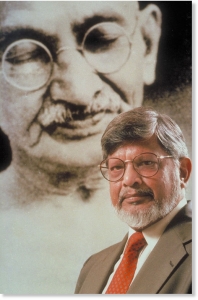 Arun Gandhi “Mr. Carmack, What you have shown in the scenario is what we are constantly doing at the personal level as well as the public level. It is the policy of exploitation that the rich employ against the poor. This is why grandfather [Mahatma Gandhi] said ‘Materialism and morality have an inverse relationship – when one increases the other decreases.’ If I may, I would like to keep the videos as resource material to teach students about economic violence in the world. With good wishes. Yours sincerely, Arun Gandhi, M.K. Gandhi Institute for Nonviolence”
Arun Gandhi “Mr. Carmack, What you have shown in the scenario is what we are constantly doing at the personal level as well as the public level. It is the policy of exploitation that the rich employ against the poor. This is why grandfather [Mahatma Gandhi] said ‘Materialism and morality have an inverse relationship – when one increases the other decreases.’ If I may, I would like to keep the videos as resource material to teach students about economic violence in the world. With good wishes. Yours sincerely, Arun Gandhi, M.K. Gandhi Institute for Nonviolence”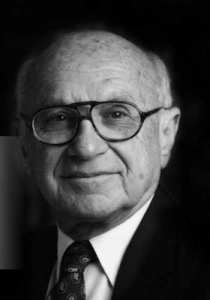 Milton Friedman “Mr. Carmack, As you know, I am entirely sympathetic with the objectives of your Monetary Reform Act…You deserve a great deal of credit for carrying through so thoroughly on your own conception…I am impressed by your persistence and attention to detail in your successive revisions… Best wishes. Milton Friedman,” Nobel Laureate in Economics; Senior Fellow, Hoover Institution on War, Revolution and Peace
Milton Friedman “Mr. Carmack, As you know, I am entirely sympathetic with the objectives of your Monetary Reform Act…You deserve a great deal of credit for carrying through so thoroughly on your own conception…I am impressed by your persistence and attention to detail in your successive revisions… Best wishes. Milton Friedman,” Nobel Laureate in Economics; Senior Fellow, Hoover Institution on War, Revolution and Peace
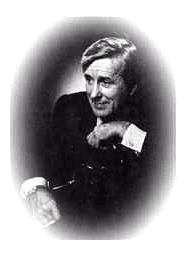 Malachi Martin “I endorse the video because people should know what is happening.” – Malachi Martin, late Professor at the Pontifical Biblical Institute and a close associate of Pope John XXIII; author of: The Windswept House; Vatican; The Keys of the Blood, and numerous other books
Malachi Martin “I endorse the video because people should know what is happening.” – Malachi Martin, late Professor at the Pontifical Biblical Institute and a close associate of Pope John XXIII; author of: The Windswept House; Vatican; The Keys of the Blood, and numerous other books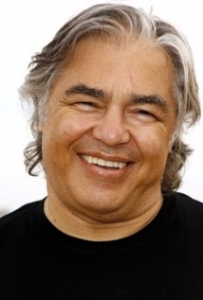 Russo “I’m a big fan of The Money Masters. It’s undoubtedly the best work on the Federal Reserve. It convinced me that the only solution to our economic troubles is the Monetary Reform Act. Before that, I had no idea how to get out of this mess. Why can’t our politicians get this? In a single year America could once again be on the path to political and economic freedom. I hold your work in the highest regard and drew from it heavily for my own film.” Aaron Russo, Feb. 2007, Hollywood Producer, Director and Writer of America, Freedom to Fascism
Russo “I’m a big fan of The Money Masters. It’s undoubtedly the best work on the Federal Reserve. It convinced me that the only solution to our economic troubles is the Monetary Reform Act. Before that, I had no idea how to get out of this mess. Why can’t our politicians get this? In a single year America could once again be on the path to political and economic freedom. I hold your work in the highest regard and drew from it heavily for my own film.” Aaron Russo, Feb. 2007, Hollywood Producer, Director and Writer of America, Freedom to Fascism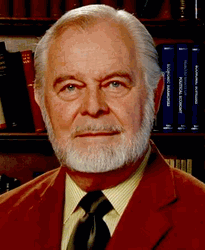 G Edward Griffin I appreciate and applaud your efforts to accomplish something specific in the area of monetary reform. . . I do not hesitate to recommend that people view The Money Masters for the excellent overview of fraudulent banking which it presents. . . G. Edward Griffin,” author of THE CREATURE FROM JEKYLL ISLAND; A Second Look at the Federal Reserve
G Edward Griffin I appreciate and applaud your efforts to accomplish something specific in the area of monetary reform. . . I do not hesitate to recommend that people view The Money Masters for the excellent overview of fraudulent banking which it presents. . . G. Edward Griffin,” author of THE CREATURE FROM JEKYLL ISLAND; A Second Look at the Federal Reserve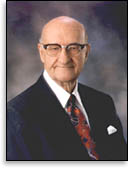 W Cleon Skousen “This is undoubtedly the most comprehensive presentation of the history of our money system and who is responsible for the disastrous consequences that has left us with an unconstitutional money system and multi-trillion dollar debt.” – Dr. W. Cleon Skousen, author of The Naked Capitalist and The Naked Communist
W Cleon Skousen “This is undoubtedly the most comprehensive presentation of the history of our money system and who is responsible for the disastrous consequences that has left us with an unconstitutional money system and multi-trillion dollar debt.” – Dr. W. Cleon Skousen, author of The Naked Capitalist and The Naked Communist